- Featured
- Asylum Seekers and Migrants
- Climate and Environmental Justice
- Disability Justice
- Economic Justice
- Education
- First Nations Justice
- Health and Medicare
- International Solidarity
- LGBTIQA+ Rights
- Media and Arts
- Occupational Health and Safety
- Public Services
- Public Transport
- Racial Justice
- Social Justice
- Women's Rights
- Workers' Rights
- More
-
Fair Pay for Community Services WorkersWages in the community services sector have not kept up with the value or complexity of our work. Then, if it wasn't bad enough, in 2025, the Fair Work Commission (FWC) proposed to change the classification structure in the SCHADS Award. The FWC proposed a 9-level classification structure modelled on the Aged Care Award. These changes could have caused 73% of workers to face weekly pay cuts ranging from $179 to $930 across various sector roles. There are up to 130,000 workers employed under the SCHADS Award. 46% of those workers faced losing over $200 per week. According to ASU surveys, 40-50% of workers would be forced to leave the sector due to financial stress if the FWC proposal was adopted. So, we fought back. We held members meetings, site visits, stunts and rallies! We gained media attention right across the country and grew significantly as a union with thousands of workers getting engaged in the campaign right across the nation. The FWC will likely make its final decision in around March. Any FWC decision will not be implemented immediately. So, in the meantime, we are running our campaign for pay increases for the community services sector. We know that when we fight, we win. We’ve done it before. We won pay increases of 23% to 45% to the minimum wages in 2012. Let’s stand together in 2026 and show everyone why we must be valued!2 of 100 SignaturesCreated by Australian Services Union Vic Tas

-
Respect Experience. Protect Wellbeing. Act Now at Brisbane City CouncilThis isn’t just policy—it’s people. At least 15 members, some with over 40 years of service, now face demotion or job loss. These are workers who have kept Brisbane running through thick and thin, many honoured with the Lord Mayor’s Award of Excellence. Council wants to turn desirable qualifications into mandatory requirements overnight. That’s not fair. It’s time to stand together and demand a fair transition that respects experience and safeguards wellbeing. By signing this petition, you demand a fair transition, genuine support, recognition of experience, and safeguards against punitive outcomes. Together, we can ensure Council values people—not just paperwork. Add your voice, sign now!632 of 800 SignaturesCreated by The Services Union

-
Stop the Cuts to the SCHADS Award - No Cuts to Equal Pay!This is about protecting the people who care for our communities — the workers who support those experiencing homelessness, family violence, mental health challenges, disability, and social isolation. These roles are often invisible, yet absolutely essential. If their pay and conditions are cut, it sends a clear message that this work - and the people they support - don’t matter. These workers hold our communities together, often under immense pressure and with little recognition. When they’re undervalued or forced out of the sector, it’s the public who suffers — through reduced services, higher burnout, and weakened care systems. This isn’t just a workers’ issue — it’s a community issue.1,145 of 2,000 SignaturesCreated by Australian Services Union Vic Tas
-
Save ParentlineParentline is a critical first line of support for Victorian parents and carers. It offers confidential, anonymous and accessible counselling on everything from child behaviour and development to family violence and mental health. When people talk about how hard parenting is, they often say “it does not come with a manual.” Parentline is as close to a manual as you can get, a trusted, expert voice to guide parents through the hardest moments. More than 15 highly qualified counsellors now face losing their jobs, taking with them hundreds of years of Child Protection and counselling experience. Removing this expertise would leave an already stretched system even weaker. Research is clear that early intervention works. For years, Parentline’s dedicated public servants have helped parents build strong family relationships, navigate crises and connect with vital community resources before problems spiral. We must save this service. Without it, thousands of Victorian families will lose an irreplaceable lifeline.1,743 of 2,000 SignaturesCreated by CPSU Victoria
-
Equal Rights Equals Respect: Stop Discrimination in Queensland workplaces nowEvery Queenslander deserves the right to work or study in a space free from harassment and discrimination. The Respect at Work laws represent a crucial step forward in creating safer, more respectful spaces for all Queenslanders – whether they are at work, university, TAFE or school. These laws were the result of extensive consultation arising from the 2020 Respect@Work Report and the 2022 Building Belonging Report. Passed by Parliament in September 2024 and scheduled to commence from 1 July this year, these reforms have now been delayed. The LNP now claims everyone wants more consultation, but we know this is simply an excuse to delay these important protections without justification. These laws include important new protections against discrimination to ensure workers cannot be sacked for extreme reasons like having fertility treatment to have a child, or because they have been a victim of family and domestic violence. They also introduce a positive duty, requiring employers to proactively prevent discrimination and harassment, rather than only responding after harm has occurred. Queenslanders cannot wait any longer. These laws need to be enacted now.2,069 of 3,000 SignaturesCreated by Queensland Unions
-
Respect kindergarten teachers and educators!The Premier cannot say Victoria is the ‘education state’ and promise parents fee-free 3 and 4-year-old kindergarten without the workforce to deliver it – and that can’t happen without investing in decent wages and working conditions. Delivering for teachers and educators who work in Victoria’s kindergartens means delivering for the children they educate. Everyone knows that for children to succeed at school they require access to high-quality kinder delivered by teachers and educators that are supported, respected and valued. Children benefit the most when their early childhood teachers and educators are well supported, paid a decent wage, and want a long term career in early childhood education. Supporting the teachers and educators who work in Victoria’s kindergartens will benefit children, who will be ready to start school; and parents, who will know their child is getting the best start to their education. - Tracey Webb, Early Childhood Educator and AEU Member10,641 of 15,000 Signatures
-
Oppose La Trobe's Student CouncilThe university is undergoing a restructure, including significant cuts, that is opposed by the LTSU and is introducing another student body to weaken the union’s ability to oppose this. Elected representatives from “another student organisation” within the last two years are ineligible for a position on the new Student Council, preventing those who have already been elected by the student body to the LTSU or LTSA from running. Additionally, the Election Regulations allow the university to “remove candidates from the election process at any time at their own discretion”. The regulations also allow the university to “share information about individual candidates on the University website and/or social media”, purportedly to promote the election. Both of these policies could allow the university to influence the results of the election and have an influence in how the Student Council runs. We, the undersigned, call on the university to cancel the formation of the Student Council as an attack on the LTSU and independent student organisation.357 of 400 SignaturesCreated by La Trobe Student Union

-
Demand employer-funded paid parental leave at G8 EducationHere are the facts: • 91% of the early childhood workforce is female. • G8 Education is one of the largest ASX-listed companies that doesn't offer employer-funded paid parental leave for their employees. • In the 2024 Global Gender Gap Report, Australian women are ranked 42nd in the world for economic participation and opportunity (down from 38 in 2023). • In Australia, a third of the gender pay gap is due to the time women spend in unpaid care work. • G8's current gender pay gap is 20.1% (of the average total remuneration according to WGEA's latest data) • By not offering employer-funded paid parental leave, G8 Education is helping to grow the gender pay gap. It is perpetuating the 'motherhood penalty' which sees the average 25-year-old woman make $2 million less in lifetime earnings than the average 25-year-old man who also becomes a parent. • Degree-qualified early childhood teachers are leaving the sector to work in schools with better pay and conditions, including employer-funded paid parental leave. If this continues, the quality of early learning in Australia will suffer as we lose dedicated and highly skilled teachers. Teachers, educators and young children deserve better. It’s time for G8 Education to step up and show they value the essential work that their teachers and educators perform. Please sign and share this petition today. * This petition supports Sustainable Investment Exchange’s campaign to pressure G8 to fund paid parental leave for staff. Learn more about the activist shareholder’s campaign here.232 of 300 SignaturesCreated by IEUA NSW/ACT Branch

-
Reproductive Leave for every workerNo one should have to work in pain or sacrifice their income to care for their health. Reproductive leave would allow workers to care for their health without financial stress or fear of discrimination. Let’s create fairer workplaces for all workers. Sign the petition to call on 10 days of reproductive leave today!596 of 600 SignaturesCreated by Unions NSW
-
Take The StandSurvivors of rape and sexual assault participate in the criminal justice system of their own free will. The system would collapse in regards to sexual crimes, without their voluntary involvement. Many do so at great personal cost. When they take the stand, they do it to keep us, the community safe. Now it’s our turn to take a stand for them and demand a criminal justice system that does not further injure those who enter it.7,441 of 8,000 SignaturesCreated by Nina Funnell
-
Protect Queensland's Abortion LawsAccess to abortion is at risk in Queensland. If the LNP get into power this October, Queensland women’s rights will be taken back to the dark ages. It has come out this week that the Katter Party is seeking a “clean repeal” of the 2018 abortion decriminalisation bill as soon as possible – and multiple LNP members have recently reaffirmed their support to wind back abortion laws in Queensland. The Katter Party have committed to introducing a private members bill to repeal the decriminalisation of abortion as soon as possible. That leaves the door wide open for the LNP to vote to make abortion a crime under a conscience vote. Day after day, David Crisafulli refuses to answer questions about whether or not he would allow a conscience vote. Last time the LNP had a conscience vote on abortion, 36 out of 39 voted for abortion to be a crime. Since then, they have continued to vote against access to abortion for regional & rural Queensland women and have hand-picked extreme anti-abortion candidates, like Amanda Stoker, to run in this election.9,463 of 10,000 SignaturesCreated by Reproductive Rights Queensland
-
Stand up for reproductive rights!Queensland women, especially women living regionally, are at risk of losing their legal right to access abortion services as well as cuts to critical funding to provide the healthcare required across all regional hospital and health services. We know their voting record: • The LNP and conservatives voted against decriminalisation of abortion in 2018. • The LNP went to the 2020 state election pledging a review of the laws which gave Queensland women abortion rights. • In 2022, they refused to rule out future attempts to unpick them in the midst of the Roe v Wade publicity across the world. • And in 2024, they voted against the introduction of the MS2-Step abortion pill. Now David Crisafulli is hedging his bets saying it wouldn’t be on the first term agenda if he’s elected as Premier but will not rule out supporting a private member’s bill. Queensland women deserve respect and better healthcare rights than this. We call on David Crisafulli, the Liberal National Party and all other conservative political parties to commit to protecting our hard-fought rights to access reproductive healthcare and abortions. So that wherever someone finds themselves in Queensland, they can access safe, funded and legal termination of pregnancy services. Authorised by J. King, Queensland Council of Unions, 16 Peel St South Brisbane.13,390 of 15,000 SignaturesCreated by Queensland Unions



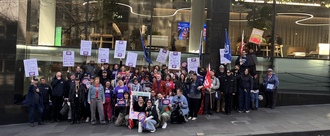

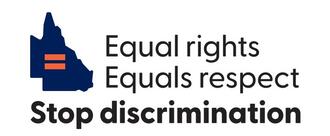
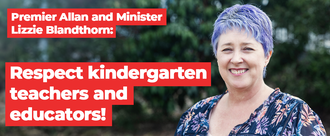
.png)

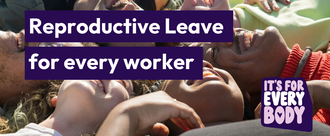

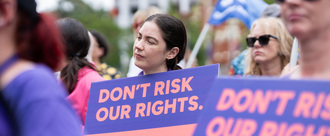
.png)